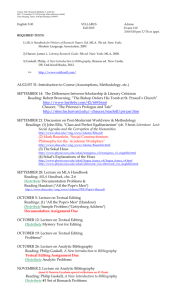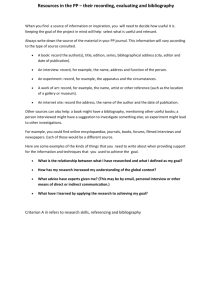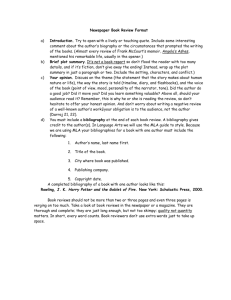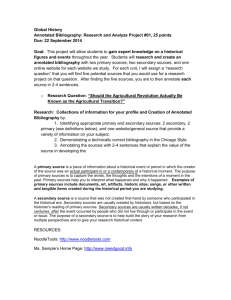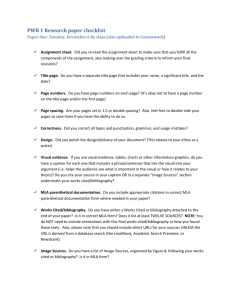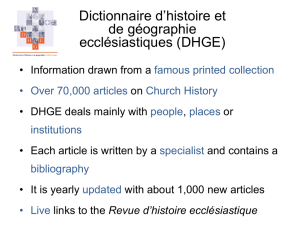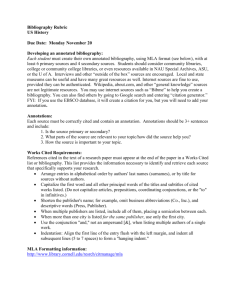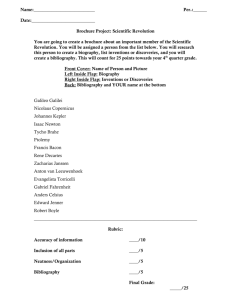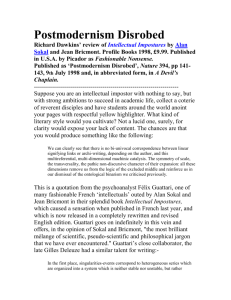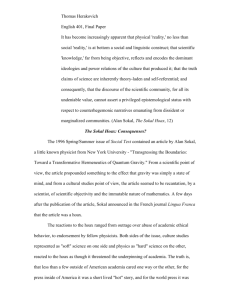Literary Research Methods
advertisement
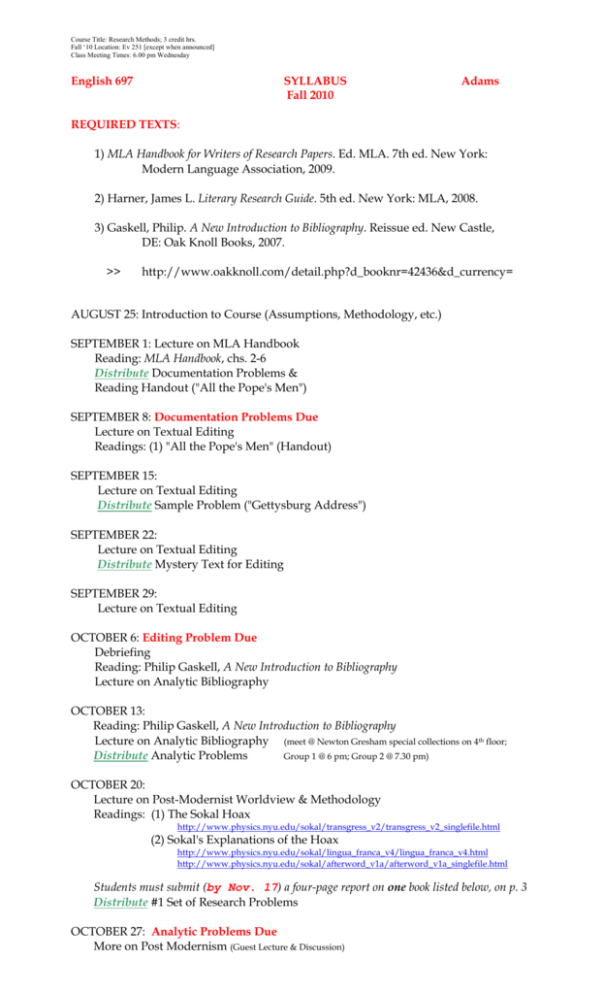
Course Title: Research Methods; 3 credit hrs. Fall ‘10 Location: Ev 251 [except when announced] Class Meeting Times: 6.00 pm Wednesday English 697 SYLLABUS Fall 2010 Adams REQUIRED TEXTS: 1) MLA Handbook for Writers of Research Papers. Ed. MLA. 7th ed. New York: Modern Language Association, 2009. 2) Harner, James L. Literary Research Guide. 5th ed. New York: MLA, 2008. 3) Gaskell, Philip. A New Introduction to Bibliography. Reissue ed. New Castle, DE: Oak Knoll Books, 2007. >> http://www.oakknoll.com/detail.php?d_booknr=42436&d_currency= AUGUST 25: Introduction to Course (Assumptions, Methodology, etc.) SEPTEMBER 1: Lecture on MLA Handbook Reading: MLA Handbook, chs. 2-6 Distribute Documentation Problems & Reading Handout ("All the Pope's Men") SEPTEMBER 8: Documentation Problems Due Lecture on Textual Editing Readings: (1) "All the Pope's Men" (Handout) SEPTEMBER 15: Lecture on Textual Editing Distribute Sample Problem ("Gettysburg Address") SEPTEMBER 22: Lecture on Textual Editing Distribute Mystery Text for Editing SEPTEMBER 29: Lecture on Textual Editing OCTOBER 6: Editing Problem Due Debriefing Reading: Philip Gaskell, A New Introduction to Bibliography Lecture on Analytic Bibliography OCTOBER 13: Reading: Philip Gaskell, A New Introduction to Bibliography Lecture on Analytic Bibliography (meet @ Newton Gresham special collections on 4th floor; Distribute Analytic Problems Group 1 @ 6 pm; Group 2 @ 7.30 pm) OCTOBER 20: Lecture on Post-Modernist Worldview & Methodology Readings: (1) The Sokal Hoax http://www.physics.nyu.edu/sokal/transgress_v2/transgress_v2_singlefile.html (2) Sokal's Explanations of the Hoax http://www.physics.nyu.edu/sokal/lingua_franca_v4/lingua_franca_v4.html http://www.physics.nyu.edu/sokal/afterword_v1a/afterword_v1a_singlefile.html Students must submit (by Nov. 17) a four-page report on one book listed below, on p. 3 Distribute #1 Set of Research Problems OCTOBER 27: Analytic Problems Due More on Post Modernism (Guest Lecture & Discussion) Distribute Sets #2, #3 of Research Problems NOVEMBER 3: Lecture on Internet Referencing Distribute Set #4 of Research Problems NOVEMBER 10: Lecture on Internet Referencing NOVEMBER 17: Lecture on Internet Referencing NOVEMBER 24: NO CLASS THANKSGIVING DECEMBER 1: Lecture on Reference Bibliography (meet @ Newton Gresham lounge) DECEMBER 8: Lecture on Reference Bibliography (meet @ Newton Gresham lounge) Reference problems are due Monday, Dec. 13th, by NOON. Course Evaluation: Your work will be weighted as follows: 1. Research Problems-----------------40% 2. Editing Problem--------------------30% 3. Analytic Problems-----------------10% 4. Book Reports------------------------10% 5. Documentation Problems--------10% Grading Scale: A = 100-92 B = 91-83 C = 82-70 (No Ds are given in MA-level classes) The purpose of ENGLISH 697 This course introduces students inductively to the processes and techniques of serious textual and historical scholarship focused on literature: the discovery, retrieval, and accurate display of all possible factual information relevant to explaining specific literary texts and their original cultural contexts. Having successfully completed this course, students will be able to conduct efficient, reliable and innovative literary research on their own -- in primary sources -- without constant dependence on others for expert opinions and bibliography. In addition, students will be able to locate and confidently evaluate for themselves both (1) the most current and (2) the most persuasive scholarship available in their chosen literary field. Random SHSU-mandated information: Student Absences on Religious Holy Days Policy Section 51.911(b) of the Texas Education Code requires that an institution of higher education excuse a student from attending classes or other required activities, including examinations, for the observance of a religious holy day, including travel for that purpose. Section 51.911(a)(2) defines religious holy days as: "a holy day observed by a religion whose places of worship are exempt from property taxation under Section 11.20, Tax Code...."A student whose absence is excused under this subsection may not be penalized for that absence and shall be allowed to take an examination or complete an assignment from which the student is excused within a reasonable time after the absence. University policy 861001 provides the procedures to be followed by the student and instructor. A student desiring to absent himself/herself from a scheduled class in order to observe (a) religious holy day(s) shall present to each instructor involved a written statement concerning the religious holy day(s). The instructor will notify the student of a reasonable timeframe in which the missed assignments and/or examinations are to be completed. Americans With Disabilities Act: SHSU adheres to all applicable federal, state, and local laws, regulations, and guidelines with respect to providing reasonable accommodations for students with disabilities. If you have a disability that may affect adversely your work in this class, then I encourage you to register with the SHSU Counseling Center and to talk with me about how I can best help you. All disclosures of disabilities will be kept strictly confidential. NOTE: no accommodation can be made until you register with the Counseling Center. Please contact the Chair of the Committee for Continuing Assistance for Disabled Students and Director of the Counseling Center, Lee Drain Annex, or by calling 294-1720. A course evaluation form will be offered near the end of the semester. Unannounced visitors to class must present a current, official SHSU identification card to be permitted into the classroom. They must not present a disruption to the class by their attendance. If the visitor is not a registered student, it is at the instructor's discretion whether or not the visitor will be allowed to remain in the classroom. If anyone creates a serious disturbance in the classroom and refuses to leave, I will have that person removed by force. Academic Dishonesty: All students are expected to engage in all academic pursuits in a manner that is above reproach. Students are expected to maintain complete honesty and integrity in the academic experiences both in and out of the classroom. Any student found guilty of dishonesty in any phase of academic work will be subject to disciplinary action. The University and its official representatives may initiate disciplinary proceedings against a student accused of any form of academic dishonesty including, but not limited to, cheating on an examination or other academic work which is to be submitted, plagiarism, collusion and the abuse of resource materials. SHSU Student Code of Conduct: http://www.shsu.edu/students/StudentGuidelines2007_2008.pdf Books Available for Written Reports 1. Richard J Evans, In Defense of History (New York: Norton, 1999). 2. Mary Lefkowitz, Not Out of Africa: How Afrocentrism Became an Excuse to Teach Myth as History (New York: Basic Books, 1996). 3. Alan Sokal and Jean Bricmont, Fashionable Nonsense: Postmodern Intellectuals’ Abuse of Science (New York: Picador, 1998). 4. John M Ellis, Literature Lost: Social Agendas and the Corruption of the Humanities (New Haven: Yale UP, 1997). 5. Richard Freadman and Seumas Miller, Re-thinking Theory: A Critique of Contemporary Literary Theory and an Alternative Account (Cambridge: Cambridge UP, 1992). 6. Keith Windschuttle, The Killing of History: How Literary Critics and Social Theorists Are Murdering Our Past (San Francisco: Encounter Books, 2000). 7. Ibn Warraq, Defending the West: A Critique of Edward Said’s Orientalism (Amherst, NY: Prometheus Books, 2007). 8. Roger Kimball, The Rape of the Masters: How Political Correctness Sabotages Art (San Francisco: Encounter Books, 2004). 9. Paul R Gross and Norman Levitt, Higher Superstition: The Academic Left and Its Quarrels with Science (Baltimore: Johns Hopkins UP, 1994). 10. Paul Boghossian, Fear of Knowledge (Oxford: Clarendon Press, 2006). 11. Noretta Koertge, A House Built on Sand: Exposing Postmodernist Myths About Science (Oxford: Oxford UP, 1998). 12. Bernard Lewis, What Went Wrong? Western Impact and Middle Eastern Response (Oxford: Oxford UP, 2002).
